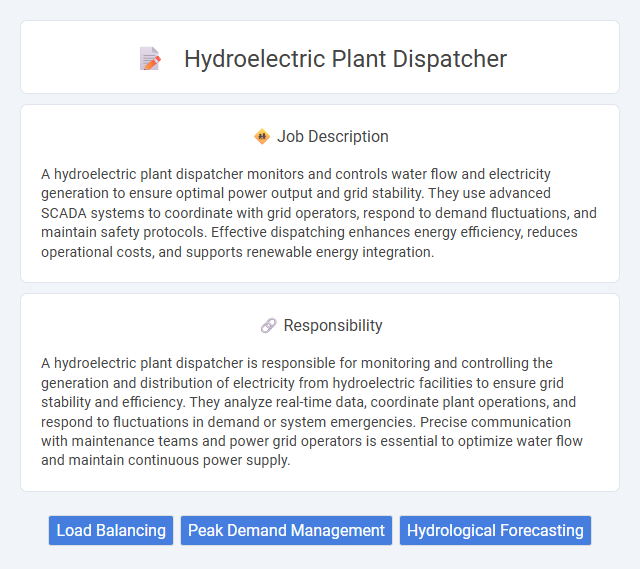
A hydroelectric plant dispatcher monitors and controls water flow and electricity generation to ensure optimal power output and grid stability. They use advanced SCADA systems to coordinate with grid operators, respond to demand fluctuations, and maintain safety protocols. Effective dispatching enhances energy efficiency, reduces operational costs, and supports renewable energy integration.
Individuals with strong problem-solving skills and the ability to remain calm under pressure are likely suitable for a hydroelectric plant dispatcher role. The job probably demands high attention to detail and the capacity to monitor complex systems continuously, which might not suit those prone to distraction or stress. Candidates who thrive in structured, safety-critical environments are more likely to succeed in this position.
Qualification
Hydroelectric plant dispatchers require a strong background in electrical or mechanical engineering, often holding a bachelor's degree in these fields or a related discipline. Proficiency in real-time monitoring systems, SCADA software, and power grid operations is critical to ensure efficient and safe energy distribution. Certifications such as NERC System Operator or equivalent credentials enhance qualifications by demonstrating expertise in regulatory compliance and operational standards.
Responsibility
A hydroelectric plant dispatcher is responsible for monitoring and controlling the generation and distribution of electricity from hydroelectric facilities to ensure grid stability and efficiency. They analyze real-time data, coordinate plant operations, and respond to fluctuations in demand or system emergencies. Precise communication with maintenance teams and power grid operators is essential to optimize water flow and maintain continuous power supply.
Benefit
Working as a hydroelectric plant dispatcher likely offers the benefit of contributing to clean, renewable energy management, which can provide a sense of environmental stewardship. There is probably a stable demand for skilled dispatchers due to the critical role they play in coordinating energy production and distribution. The position may also come with competitive compensation and opportunities for technical skill development in the energy sector.
Challenge
The role of a hydroelectric plant dispatcher likely involves managing complex real-time operations to ensure optimal energy production and grid stability. They probably face challenges related to fluctuating water flows, equipment reliability, and rapid decision-making under pressure. Accuracy and quick response are essential to minimize downtime and maximize efficiency in dynamic conditions.
Career Advancement
Hydroelectric plant dispatcher roles offer significant opportunities for career advancement through gaining expertise in energy management systems and grid operations. Mastery in real-time monitoring, load forecasting, and coordination with regulatory bodies enhances eligibility for senior roles such as operations manager or energy systems analyst. Continuous professional development and certifications in energy distribution and safety protocols further accelerate promotion prospects within the renewable energy sector.
Key Terms
Load Balancing
Hydroelectric plant dispatchers manage real-time load balancing by adjusting turbine output to meet fluctuating electricity demand while maintaining grid stability. They analyze data from water inflows, reservoir levels, and grid frequency to optimize energy production and prevent overloads or shortages. Precise coordination with grid operators ensures efficient resource allocation and supports renewable energy integration.
Peak Demand Management
Hydroelectric plant dispatchers play a crucial role in peak demand management by efficiently controlling water flow and turbine operation to match electricity generation with fluctuating consumption patterns. They analyze real-time grid data and weather forecasts to optimize reservoir levels, ensuring maximum output during high-demand periods while maintaining environmental compliance. Precise coordination with grid operators minimizes power outages and enhances grid stability during peak load times.
Hydrological Forecasting
Hydroelectric plant dispatchers rely heavily on hydrological forecasting to optimize power generation while maintaining reservoir levels and ensuring environmental compliance. Accurate predictions of river flows, precipitation, and snowmelt directly inform water release schedules to maximize energy output and prevent flooding risks. Integration of real-time hydrological data and meteorological models enhances decision-making for efficient and sustainable dispatch operations.
 kuljobs.com
kuljobs.com